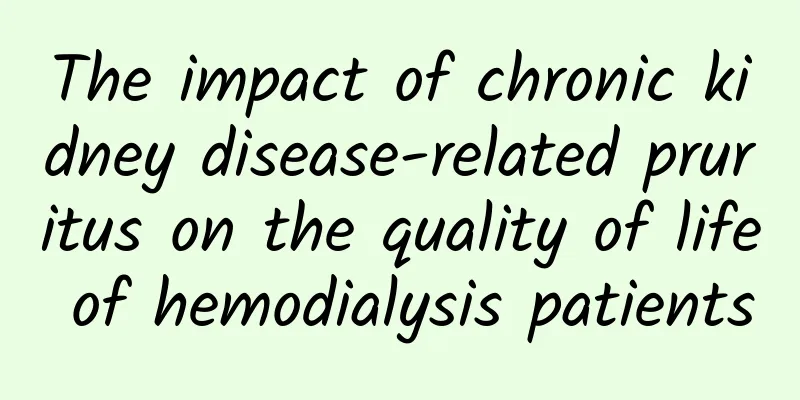The impact of chronic kidney disease-related pruritus on the quality of life of hemodialysis patients

|
Chronic kidney disease-associated pruritus (CKD-aP) is a common clinical symptom in hemodialysis patients. DOPPS data showed that 40% of hemodialysis patients suffered from moderate to severe pruritus, and an independent meta-analysis reported that 50% of hemodialysis patients suffered from skin pruritus. Chronic pruritus significantly affects the health status and quality of life of hemodialysis patients, such as being accompanied by a higher mortality rate, increased number of hospitalizations, and affecting the quality of dialysis and mental health of patients. In severe cases, patients' dialysis and drug compliance are also poor. Therefore, CKD-aP needs to be intervened more strongly. CKD-aP seriously affects the quality of life of hemodialysis patients and brings them multiple burdens. Sleep disorders CKD-aP often worsens at night, which has a serious impact on the sleep of hemodialysis patients. Continuous itching sensations can interfere with the patient's sleep cycle, causing difficulty falling asleep, multiple awakenings, reduced sleep time and decreased sleep quality, making the patient drowsy during the day, which in turn affects work and daily life. Yamada et al. reported that 1289 (66.9%) of the 1927 hemodialysis patients surveyed in 2009 experienced itching, and 461 (41.2%) of the 1120 hemodialysis patients experienced itching-related sleep disorders. Omori et al. found in a survey of 2550 hemodialysis patients that patients with severe itching were more likely to have sleep disorders. For hemodialysis patients with CKD-aP, improving sleep quality is crucial. Clinicians should pay close attention to the itching problem of hemodialysis patients and take appropriate measures to treat it to alleviate the itching symptoms and improve the patient's sleep. For patients whose sleep is severely affected, drug treatment is required, such as antihistamines, sedatives or other drugs to control itching. Central sedative hypnotics, such as barbiturates and dihydrobenzodiazepines, are often used in clinical practice, and the most widely used are benzodiazepines. However, benzodiazepines have many adverse reactions, such as drowsiness, mental dependence, staggering, etc. Long-term use is prone to drug resistance and dependence, and sudden withdrawal may cause withdrawal symptoms. The newly launched nalfuraphine hydrochloride can help hemodialysis patients with CKD-aP relieve pruritus symptoms and improve sleep. Nalfuraphine hydrochloride is a highly selective opioid κ receptor agonist that exerts its antipruritic effect through a new mechanism of action that is completely different from existing antihistamines or antiallergic drugs. To evaluate the effectiveness of nalfuraphine hydrochloride, a study surveyed 215 CKD-aP patients receiving maintenance hemodialysis before and after taking nalfuraphine hydrochloride. The results showed that nalfuraphine hydrochloride can improve patients' sleep disorders and improve treatment satisfaction. After taking nalfuraphine hydrochloride, 80% of patients had no sleep disorders, and treatment satisfaction (satisfied and very satisfied) reached 70.6%. A possible explanation for the low satisfaction of hemodialysis patients with pruritus treatment is that in many patients, pruritus involves a complex interaction of multiple factors, which may lead to treatment resistance. In this study, nalfuraphine hydrochloride suppressed existing treatment-resistant pruritus and reduced or stopped the dose of ineffective treatment. Impact on mental health First, insomnia and decreased sleep quality caused by pruritus can directly lead to anxiety, depression and emotional instability in hemodialysis patients. Secondly, pruritus often causes great discomfort and distress to patients, especially when it is difficult to relieve, which may lead to anxiety, depression, irritability and mood swings, thus affecting the patient's mental health. Finally, embarrassment and skin lesion symptoms caused by skin scratching can reduce the patient's self-esteem and self-confidence, so they may avoid participating in social activities or contact with others, causing patients to feel lonely and disconnected from society. It has been reported that the prevalence of depression in patients with moderate to severe pruritus-related disorders in daily life is 1.3 to 1.7 times that of patients without pruritus. For hemodialysis patients with CKD-aP, in addition to actively treating the itching symptoms, it is also necessary to care about the patient's mental health. Doctors and nurses should establish close communication with patients, encourage, comfort, and enlighten patients; ask questions carefully, listen patiently, and understand the patient's mental state and psychological needs; teach patients how to regulate their own emotions so that the patient's anxiety and depression can be released and relieved. If necessary, it is recommended that patients go to the psychological counseling department for psychotherapy, which can help patients learn to cope with anxiety and depression and improve their ability to cope with the psychological pressure brought by CKD-aP. The nalfuraphine hydrochloride introduced above can not only alleviate sleep disorders while relieving CKD-aP, but also improve the anxiety of hemodialysis patients. Skin damage Long-term itching sensation may make it difficult for CKD-aP patients to control the urge to scratch, resulting in the following varying degrees of skin damage: (1) Scratches: Patients may scratch their skin with their nails or other objects, resulting in scratches on the skin surface. (2) Ulcers: Frequent scratching may further aggravate skin surface damage and form ulcers. (3) Infection: Scratching caused by itching may damage the patient's skin's protective barrier, making it easy for bacteria to enter the skin and cause infection. Infection may cause local redness, swelling, pain, and pus discharge. (4) Pigmentation: Scratching caused by itching may cause local pigmentation of the skin, manifested as darkening of the skin or uneven color spots. (5) Scar formation: Severe skin damage may lead to scar formation, affecting the appearance of the skin. For hemodialysis patients with CKD-aP, in addition to actively treating the itching itself, they should also avoid scratching the skin to reduce the risk of skin damage. For patients who have scratched due to itching and have skin damage, timely treatment should be provided, and skin care advice should be provided to reduce the degree of skin damage and itching and improve the quality of life of patients. summary CKD-aP seriously affects the quality of life of hemodialysis patients and leads to poor prognosis for patients. Its treatment includes drug therapy, skin care, psychological support therapy and daily life guidance. These measures can relieve itching symptoms, reduce pruritus insomnia, relieve anxiety and depression, and improve the quality of life of patients. However, many drugs for the treatment of CKD-aP are currently used off-label. Fortunately, nalfurafur hydrochloride orodispersible tablets have recently been approved for marketing to improve pruritus in hemodialysis patients. It is reported that after nalfurafur hydrochloride was launched in Japan, it changed the pattern of CKD-aP treatment drugs, reducing the use rate of antihistamines, anti-allergic drugs and other drugs by about 20%. We look forward to its performance in my country. |
<<: The Dirtiest Thing on Eggs: You Might Be Eating Them! (Not What You Think)
>>: What is the most common inherited kidney disease?
Recommend
Precautions for pregnancy with loose cervix
Cervical relaxation is a common gynecological dis...
What should I do if my period hasn’t ended after 15 days?
Menstruation is something that all of us women ha...
What should I do if my period is still not over after 10 days?
Menstruation is a blessing for women every month....
What should I do if the lochia has not been discharged for a month?
Regardless of whether you choose a natural birth ...
How many calories are there in Xinjiang fried rice noodles? How to make Xinjiang fried rice noodles
Xinjiang fried rice noodles is a Northwest dish a...
Diabetes is becoming younger, do you still think young people are tough?
Why is diabetes becoming younger? The tendency of...
Symptoms of menopause
Due to their special physiological structure, nor...
[Medical Q&A] Beware of middle-aged obesity: Will it induce endocrine diseases?
Planner: Chinese Medical Association Reviewer: Go...
What are the methods for regulating long menstrual periods for women?
Generally speaking, under normal circumstances, w...
Leucorrhea is like tofu dregs
Gynecological diseases generally occur in women o...
Urgent reminder to parents in Guangdong! Children frequently get sick after being injected with this drug, and this has happened in many places!
recently #6-year-old child gets sick frequently a...
Thirty-one weeks pregnant, hard stomach
After thirty-one weeks of pregnancy, it usually m...
How long does it take for the egg to implant after fertilization?
I believe that everyone who has experienced it kn...
What should I do if I get spots during breastfeeding?
As a woman, there are so many troubles to encount...
How long does bed rest require to preserve the pregnancy?
After a woman becomes pregnant, the fetus is unst...









